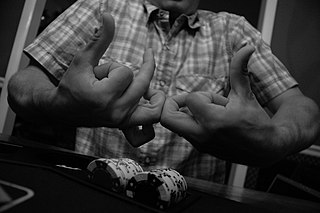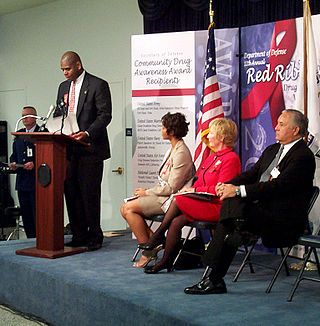A gang is a group or society of associates, friends, or members of a family with a defined leadership and internal organization that identifies with or claims control over territory in a community and engages, either individually or collectively, in illegal, and possibly violent, behavior, with such behavior often constituting a form of organized crime.

The Bloods are a primarily African-American street gang which was founded in Los Angeles, California. The gang is widely known for its rivalry with the Crips. It is identified by the red color worn by its members and by particular gang symbols, including distinctive hand signs.

Juvenile delinquency, also known as juvenile offending, is the act of participating in unlawful behavior as a minor or individual younger than the statutory age of majority. These acts would otherwise be considered crimes if the individuals committing them were older. The term delinquent usually refers to juvenile delinquency, and is also generalised to refer to a young person who behaves an unacceptable way.
Prison rape commonly refers to the rape of inmates in prison by other inmates or prison staff. In 2001, Human Rights Watch estimated that at least 4.3 million inmates had been raped while incarcerated in the United States. A United States Department of Justice report, Sexual Victimization in Prisons and Jails Reported by Inmates, states that "In 2011–12, an estimated 4.0% of state and federal prison inmates and 3.2% of jail inmates reported experiencing one or more incidents of sexual victimization by another inmate or facility staff in the past 12 months or since admission to the facility, if less than 12 months." However, advocates dispute the accuracy of the numbers, saying they seem to under-report the real numbers of sexual assaults in prison, especially among juveniles.

Ephebiphobia is the fear of youth. First coined as the "fear or loathing of teenagers", today the phenomenon is recognized as the "inaccurate, exaggerated and sensational characterization of young people" in a range of settings around the world. Studies of the fear of youth occur in sociology and youth studies. It is distinguished from pedophobia by being more focused on adolescents than prepubescent children.

The Crips are a primarily African-American alliance of street gangs that are based in the coastal regions of Southern California. Founded in Los Angeles, California, in 1969, mainly by Raymond Washington and Stanley Williams, the Crips began as an alliance between two autonomous gangs, and developed into a loosely connected network of individual "sets", often engaged in open warfare with one another. Its members have traditionally worn blue clothing since around 1973.

The California Division of Juvenile Justice (DJJ), previously known as the California Youth Authority (CYA), was a division of the California Department of Corrections and Rehabilitation that provided education, training, and treatment services for California's most serious youth offenders, until its closure in 2023. These youths were committed by the juvenile and criminal courts to DJJ's eleven correctional facilities, four conservation camps and two residential drug treatment programs. The DJJ provided services to juvenile offenders, ranging in age from twelve to 25, in facilities and on parole, and worked closely with law enforcement, the courts, district attorneys, public defenders, probation offices and other public and private agencies involved with the problems of youth. The DJJ underwent reorganization as required by a court agreement and the California State Legislature after widespread criticisms of conditions at its youth prisons. The agency's headquarters were in Sacramento, California.

The American juvenile justice system is the primary system used to handle minors who are convicted of criminal offenses. The system is composed of a federal and many separate state, territorial, and local jurisdictions, with states and the federal government sharing sovereign police power under the common authority of the United States Constitution. The juvenile justice system intervenes in delinquent behavior through police, court, and correctional involvement, with the goal of rehabilitation. Youth and their guardians can face a variety of consequences including probation, community service, youth court, youth incarceration and alternative schooling. The juvenile justice system, similar to the adult system, operates from a belief that intervening early in delinquent behavior will deter adolescents from engaging in criminal behavior as adults.
Troy Smith Duster is an American sociologist with research interests in the sociology of science, public policy, race and ethnicity and deviance. He is a Chancellor’s Professor of Sociology at University of California, Berkeley, and professor of sociology and director of the Institute for the History of the Production of Knowledge at New York University. Duster is on the faculty advisor boards of the Berkeley Center for Social Medicine and the Berkeley Center for Right-Wing Studies.

Approximately 1.4 million people in the United States were part of gangs as of 2011, and more than 33,000 gangs were active in the country. These include national street gangs, local street gangs, prison gangs, outlaw motorcycle clubs, and ethnic and organized crime gangs.

The Nazi Lowriders, also known as NLR or the Ride, are a neo-Nazi, white supremacist organized crime syndicate, and prison and street gang in the United States. Primarily based in Southern California, the gang is allied with the larger Aryan Brotherhood and Mexican Mafia gangs, and fellow peckerwood gang Public Enemy No. 1. The Nazi Lowriders operate both in and outside of prison.
In the United States, life imprisonment is the most severe punishment provided by law in states with no valid capital punishment statute, and second-most in those with a valid statute. According to a 2013 study, 1 of every 2 000 inhabitants of the U.S. were imprisoned for life as of 2012.

Race in the United States criminal justice system refers to the unique experiences and disparities in the United States in regard to the policing and prosecuting of various races. There have been different outcomes for different racial groups in convicting and sentencing felons in the United States criminal justice system. Although prior arrests and criminal history is also a factor. Experts and analysts have debated the relative importance of different factors that have led to these disparities.

California Proposition 6, also known as the Safe Neighborhoods Act and The Runner Initiative, is a statutory initiative that appeared on the November 2008 ballot in California. This proposition was rejected by voters on November 4 of that year.

The United States incarcerates more of its youth than any other country in the world, through the juvenile courts and the adult criminal justice system, which reflects the larger trends in incarceration practices in the United States. In 2010, approximately 70,800 juveniles were incarcerated in youth detention facilities alone. As of 2006, approximately 500,000 youth were brought to detention centers in a given year. This data does not reflect juveniles tried as adults. As of 2013, around 40% were incarcerated in privatized, for-profit facilities.
African Americans, and African American males in particular, have an ethnic stereotype in which they are portrayed as dangerous criminals. This stereotype is associated with the fact that African Americans are proportionally over-represented in the numbers of those that are arrested and convicted for committing crimes. It has appeared frequently in American popular culture, reinforcing the negative consequences of systemic racism.

Partnership to End Addiction, formerly called The Partnership for a Drug Free America, is a non-profit organization aiming to prevent the misuse of illegal drugs. The organization is most widely known for its TV ad This Is Your Brain on Drugs.

Proposition 47, also known by its ballot title Criminal Sentences. Misdemeanor Penalties. Initiative Statute, was a referendum passed by voters in the state of California on November 4, 2014. The measure was also referred to by its supporters as the Safe Neighborhoods and Schools Act. It recategorized some nonviolent offenses as misdemeanors, rather than felonies, as they had previously been categorized.
The Anti-Recidivism Coalition (ARC) is a Los Angeles–based nonprofit organization founded by Scott Budnick. ARC is a support network for formerly incarcerated individuals and advocates for criminal justice reform. ARC's mission is to reduce incarceration, improve the outcomes of formerly incarcerated individuals, and build healthier communities.
The superpredator or super-predator was a type of criminal in a largely-debunked criminological theory that became popular in the 1990s in the United States. The superpredator theory posited that a small but significant and increasing population of impulsive youth were willing to commit violent crimes without remorse. John J. DiIulio Jr., the criminologist and political scientist who came up with the idea, predicted a large increase in youth crime and violence due to superpredators. American lawmakers seized on this idea, and implemented tough-on-crime legislation for juvenile offenders across the country, including life without parole sentences.












